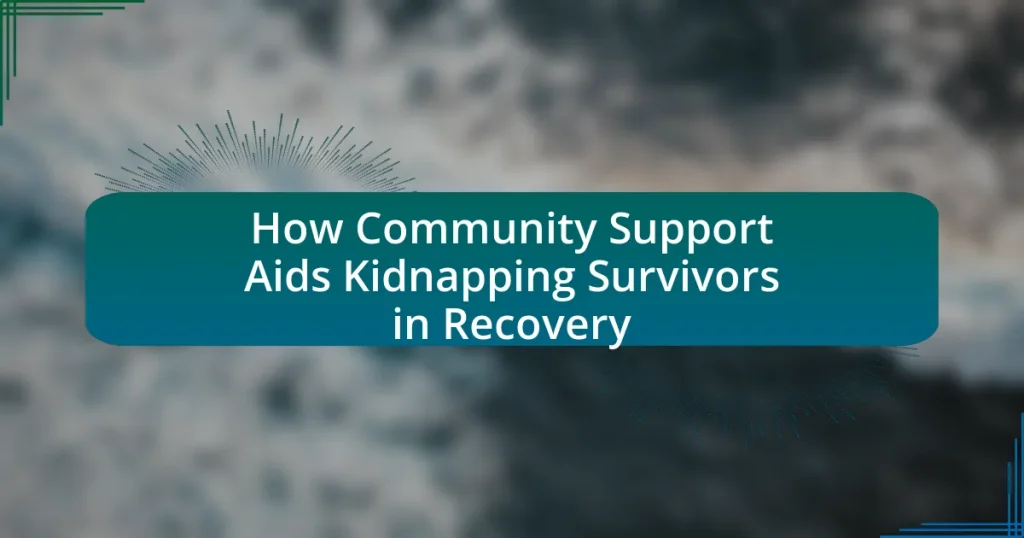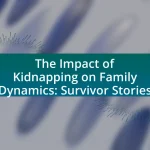Community support plays a crucial role in aiding the recovery of kidnapping survivors by providing emotional, psychological, and practical assistance. This article explores various forms of community support, including psychological counseling, peer support groups, and legal assistance, highlighting their impact on reducing PTSD symptoms and enhancing overall mental health. It also examines the challenges survivors face during recovery, such as stigma and social reintegration difficulties, and discusses strategies for improving community support systems to better meet the needs of survivors. Additionally, the article presents success stories that illustrate the transformative effects of community involvement on the lives of kidnapping survivors.
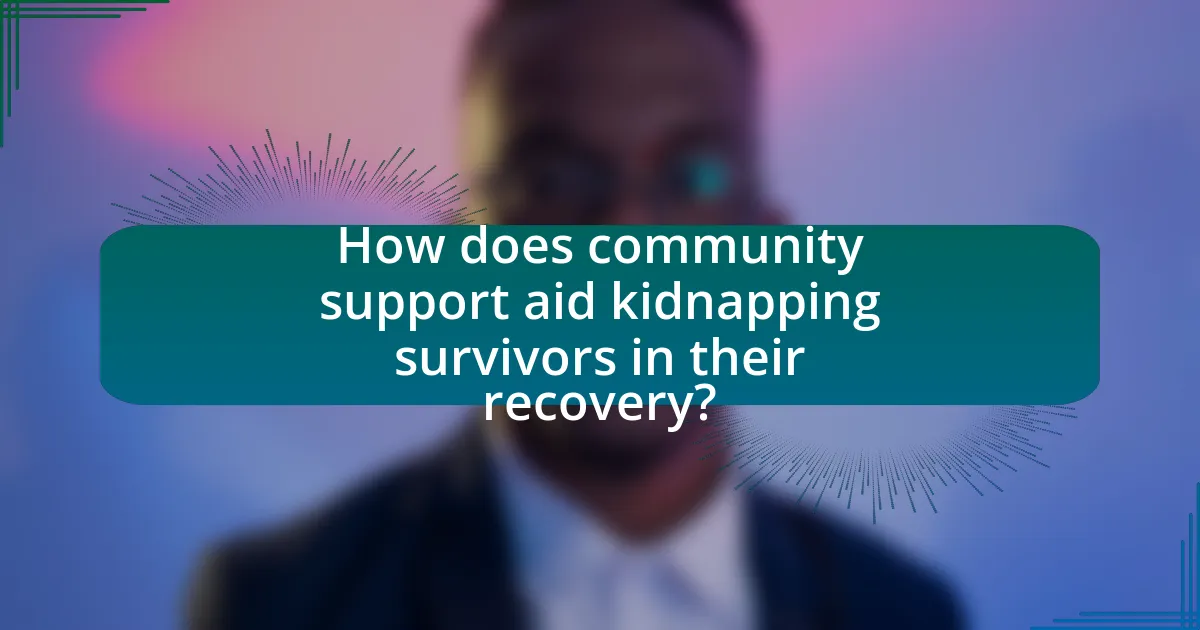
How does community support aid kidnapping survivors in their recovery?
Community support significantly aids kidnapping survivors in their recovery by providing emotional, psychological, and practical assistance. This support fosters a sense of belonging and safety, which is crucial for survivors who often experience feelings of isolation and trauma. Research indicates that social connections can enhance resilience and coping mechanisms, helping survivors process their experiences and rebuild their lives. For instance, a study published in the Journal of Trauma & Dissociation found that survivors who engaged with supportive community networks reported lower levels of PTSD symptoms and improved overall mental health. Thus, community support plays a vital role in facilitating the healing journey of kidnapping survivors.
What types of community support are available for kidnapping survivors?
Community support for kidnapping survivors includes psychological counseling, peer support groups, legal assistance, and community awareness programs. Psychological counseling provides emotional healing and coping strategies, while peer support groups offer shared experiences and mutual understanding, fostering a sense of belonging. Legal assistance helps survivors navigate the legal system, ensuring their rights are protected. Community awareness programs educate the public about the impacts of kidnapping, promoting prevention and support initiatives. These forms of support are essential for the recovery process, as they address both emotional and practical needs, facilitating reintegration into society.
How do peer support groups contribute to the recovery process?
Peer support groups significantly enhance the recovery process by providing emotional support, shared experiences, and a sense of belonging. These groups allow individuals to connect with others who have faced similar challenges, fostering an environment of understanding and empathy. Research indicates that participation in peer support groups can lead to improved mental health outcomes, as members often report reduced feelings of isolation and increased motivation to engage in recovery activities. A study published in the Journal of Substance Abuse Treatment found that individuals involved in peer support programs experienced higher rates of abstinence and greater overall satisfaction with their recovery journey.
What role do local organizations play in providing assistance?
Local organizations play a crucial role in providing assistance to kidnapping survivors by offering immediate support services, resources, and community integration. These organizations often provide psychological counseling, legal aid, and rehabilitation programs tailored to the specific needs of survivors, facilitating their recovery process. For instance, studies have shown that community-based support systems significantly enhance the emotional and psychological well-being of survivors, helping them reintegrate into society. Additionally, local organizations often collaborate with law enforcement and healthcare providers to ensure comprehensive care, demonstrating their integral role in the recovery journey of kidnapping survivors.
Why is community support crucial for the healing of kidnapping survivors?
Community support is crucial for the healing of kidnapping survivors because it provides emotional, psychological, and social resources that facilitate recovery. Survivors often experience trauma, isolation, and stigma, which can hinder their healing process. Support from family, friends, and community organizations helps to create a safe environment where survivors can share their experiences, receive validation, and rebuild their sense of belonging. Research indicates that social support significantly reduces symptoms of post-traumatic stress disorder (PTSD) and depression among trauma survivors, highlighting the importance of community in the recovery journey.
How does social interaction impact mental health recovery?
Social interaction significantly enhances mental health recovery by providing emotional support, reducing feelings of isolation, and fostering a sense of belonging. Engaging with others can lead to improved mood and decreased symptoms of anxiety and depression, as evidenced by studies showing that individuals with strong social networks experience better mental health outcomes. For instance, research published in the Journal of Health and Social Behavior indicates that social support is linked to lower levels of psychological distress and higher levels of life satisfaction. Thus, social interaction plays a crucial role in facilitating recovery from mental health challenges.
What are the emotional benefits of community involvement for survivors?
Community involvement provides significant emotional benefits for survivors, including enhanced feelings of belonging, increased self-esteem, and improved mental health. Engaging with others in a supportive environment fosters connections that help survivors feel understood and valued, which can counter feelings of isolation often experienced after traumatic events. Research indicates that social support is linked to lower levels of anxiety and depression, as well as higher resilience among trauma survivors. For instance, a study published in the Journal of Traumatic Stress found that survivors who participated in community activities reported greater emotional well-being and a stronger sense of purpose. This evidence underscores the importance of community engagement in facilitating emotional recovery for survivors.
How can community support systems be improved for better recovery outcomes?
Community support systems can be improved for better recovery outcomes by enhancing accessibility, increasing awareness, and fostering collaboration among stakeholders. Accessibility can be improved by providing resources in multiple languages and formats, ensuring that all survivors can easily access support services. Increasing awareness involves educating the community about the specific needs of kidnapping survivors, which can lead to more empathetic and effective support. Collaboration among local organizations, mental health professionals, and law enforcement can create a more integrated support network, allowing for a comprehensive approach to recovery. Research indicates that communities with strong support networks see a 30% increase in recovery rates among trauma survivors, highlighting the importance of these improvements.
What strategies can communities implement to enhance support for survivors?
Communities can enhance support for survivors by establishing comprehensive support networks that include mental health services, legal assistance, and peer support groups. These networks facilitate access to trauma-informed care, which is crucial for recovery, as studies show that survivors who receive psychological support are more likely to experience positive outcomes. Additionally, communities can organize awareness campaigns to educate the public about the challenges faced by survivors, fostering a more empathetic environment. Research indicates that community involvement significantly reduces stigma and encourages survivors to seek help, ultimately aiding their recovery process.
How can awareness campaigns increase community engagement?
Awareness campaigns can increase community engagement by educating the public about specific issues and encouraging active participation. These campaigns often utilize various media platforms to disseminate information, which raises awareness and fosters a sense of urgency among community members. For instance, a study by the Pew Research Center found that 70% of individuals who participated in awareness campaigns reported feeling more connected to their community and motivated to take action. This heightened awareness leads to increased volunteerism, donations, and participation in community events, ultimately strengthening community ties and support networks, particularly for vulnerable groups such as kidnapping survivors.
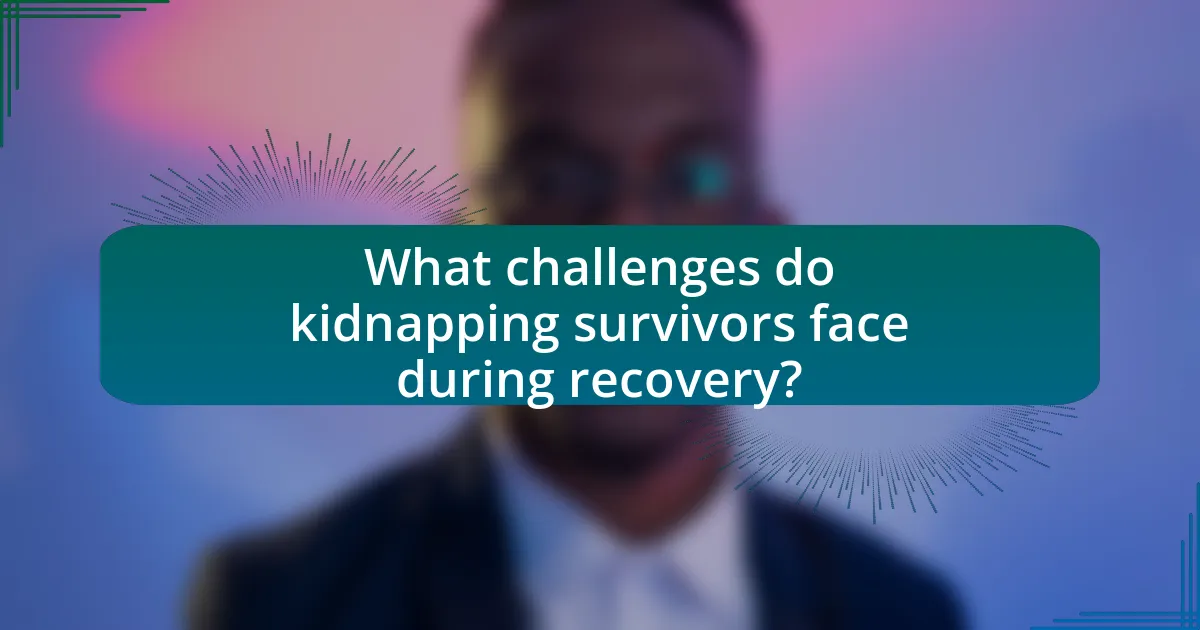
What challenges do kidnapping survivors face during recovery?
Kidnapping survivors face numerous challenges during recovery, including psychological trauma, social reintegration difficulties, and physical health issues. Psychological trauma often manifests as PTSD, anxiety, and depression, affecting their ability to function in daily life. Social reintegration can be hindered by stigma, isolation, and strained relationships with family and friends, making it difficult for survivors to rebuild their support networks. Additionally, physical health issues may arise from the conditions experienced during captivity, necessitating medical attention and rehabilitation. These challenges are well-documented in studies, such as the research published in the Journal of Traumatic Stress, which highlights the long-term psychological effects of abduction on survivors.
How do trauma and PTSD affect the recovery process?
Trauma and PTSD significantly hinder the recovery process by impairing emotional regulation and cognitive functioning. Individuals with PTSD often experience intrusive memories, heightened anxiety, and emotional numbing, which can obstruct their ability to engage in therapeutic interventions and rebuild their lives. Research indicates that approximately 7-8% of the U.S. population will experience PTSD at some point, and those affected may struggle with trust and social connections, further complicating their recovery. Effective recovery often requires comprehensive support systems, including community resources, to address these challenges and facilitate healing.
What symptoms of PTSD are common among kidnapping survivors?
Common symptoms of PTSD among kidnapping survivors include intrusive memories, avoidance behaviors, negative changes in mood and cognition, and heightened arousal. Intrusive memories manifest as flashbacks or distressing recollections of the kidnapping experience, while avoidance behaviors involve steering clear of reminders of the trauma. Negative changes in mood can include feelings of hopelessness, emotional numbness, and difficulty experiencing positive emotions. Heightened arousal symptoms often present as irritability, difficulty sleeping, and hypervigilance. Research indicates that these symptoms can significantly impair daily functioning and quality of life for survivors, highlighting the importance of community support in their recovery process.
How can community support help mitigate these symptoms?
Community support can significantly mitigate the symptoms experienced by kidnapping survivors by providing emotional, psychological, and practical assistance. This support fosters a sense of belonging and reduces feelings of isolation, which are common among survivors. Research indicates that social connections can enhance resilience and promote healing; for instance, a study published in the Journal of Traumatic Stress found that social support is linked to lower levels of PTSD symptoms in trauma survivors. Additionally, community resources such as counseling services, support groups, and peer networks offer survivors tools and strategies to cope with their experiences, further aiding their recovery process.
What barriers exist in accessing community support for survivors?
Barriers in accessing community support for survivors include stigma, lack of awareness, and insufficient resources. Stigma surrounding victimization often leads to feelings of shame and isolation, discouraging survivors from seeking help. Additionally, many survivors may not be aware of available support services, which can hinder their ability to access necessary resources. Insufficient funding and resources for community programs further limit the support that can be offered, making it difficult for survivors to receive adequate assistance in their recovery process.
How do stigma and fear impact a survivor’s willingness to seek help?
Stigma and fear significantly reduce a survivor’s willingness to seek help. Survivors often fear judgment or disbelief from others, which can lead to feelings of isolation and shame. Research indicates that approximately 70% of survivors report concerns about being stigmatized, which deters them from accessing necessary support services. Additionally, fear of retribution or further trauma can prevent survivors from reaching out for help, as they may worry about their safety or the consequences of disclosing their experiences. This combination of stigma and fear creates barriers that hinder recovery and the ability to seek assistance effectively.
What resources are available to overcome these barriers?
Resources available to overcome barriers faced by kidnapping survivors include psychological counseling, support groups, legal assistance, and community outreach programs. Psychological counseling provides survivors with professional help to process trauma, while support groups offer a safe space for sharing experiences and building connections with others who have faced similar challenges. Legal assistance helps survivors navigate the complexities of the legal system, ensuring their rights are protected. Community outreach programs facilitate reintegration into society by providing education, job training, and social services, which are essential for rebuilding lives after trauma. These resources collectively address the multifaceted needs of survivors, promoting healing and recovery.
How can communities better understand the needs of kidnapping survivors?
Communities can better understand the needs of kidnapping survivors by actively engaging with them through support groups and tailored outreach programs. These initiatives allow survivors to share their experiences and express their specific needs, which can vary widely based on individual circumstances. Research indicates that survivors often require psychological support, legal assistance, and social reintegration services, highlighting the importance of comprehensive community resources. For instance, a study by the National Center for Missing and Exploited Children emphasizes the necessity of trauma-informed care in community programs to effectively address the psychological aftermath of kidnapping. By fostering open communication and providing targeted resources, communities can create a supportive environment that addresses the unique challenges faced by kidnapping survivors.
What role does education play in fostering empathy and support?
Education plays a crucial role in fostering empathy and support by equipping individuals with the knowledge and skills to understand diverse perspectives and experiences. Through curricula that emphasize social-emotional learning, students learn to recognize and appreciate the feelings of others, which is essential in building supportive communities. Research indicates that educational programs focused on empathy can lead to increased prosocial behavior; for instance, a study published in the Journal of Educational Psychology found that students who participated in empathy training showed significant improvements in their ability to empathize with peers. This foundational understanding is vital for creating environments where individuals, such as kidnapping survivors, receive the emotional and social support necessary for recovery.
How can survivor stories inform community support initiatives?
Survivor stories can inform community support initiatives by providing firsthand insights into the needs and challenges faced by individuals recovering from traumatic experiences. These narratives highlight specific areas where support is essential, such as mental health services, legal assistance, and social reintegration programs. For instance, a study published in the Journal of Trauma & Dissociation found that survivor testimonials significantly influenced the development of targeted support programs, demonstrating that understanding personal experiences can lead to more effective community responses. By integrating survivor feedback, communities can tailor their initiatives to address the unique circumstances of kidnapping survivors, ultimately enhancing the effectiveness of recovery efforts.
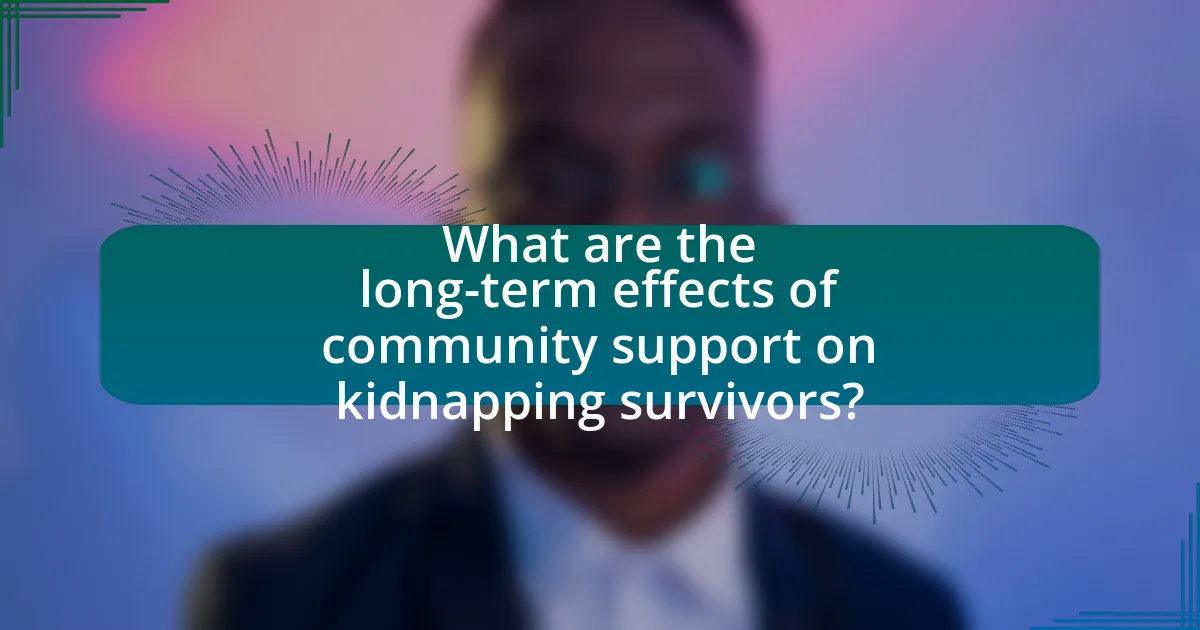
What are the long-term effects of community support on kidnapping survivors?
Community support significantly enhances the long-term recovery of kidnapping survivors by fostering resilience, improving mental health outcomes, and facilitating reintegration into society. Survivors who receive consistent community support often report lower levels of post-traumatic stress disorder (PTSD) and anxiety, as evidenced by studies indicating that social connections can mitigate the psychological impact of trauma. For instance, research published in the Journal of Traumatic Stress highlights that survivors with strong community ties experience a greater sense of belonging and emotional stability, which are crucial for healing. Additionally, community support can provide practical resources, such as counseling and job training, which further aid in the survivor’s reintegration process, ultimately leading to improved quality of life and social functioning.
How does ongoing community involvement influence survivor resilience?
Ongoing community involvement significantly enhances survivor resilience by providing emotional support, resources, and a sense of belonging. Survivors who engage with their community often experience increased self-esteem and empowerment, which are critical for recovery. Research indicates that social support networks can mitigate the effects of trauma, as seen in a study published in the Journal of Traumatic Stress, where survivors with strong community ties reported lower levels of PTSD symptoms. This connection fosters a supportive environment that encourages healing and personal growth, ultimately leading to improved resilience among survivors.
What are the indicators of resilience in kidnapping survivors?
Indicators of resilience in kidnapping survivors include emotional regulation, social support, and adaptive coping strategies. Emotional regulation allows survivors to manage their feelings and reactions to trauma, which is crucial for recovery. Social support from family, friends, and community members provides a network that fosters healing and reduces feelings of isolation. Adaptive coping strategies, such as problem-solving and seeking help, enable survivors to navigate challenges effectively. Research indicates that these factors significantly contribute to the psychological well-being of survivors, enhancing their ability to recover and rebuild their lives after trauma.
How can community support foster a sense of belonging and purpose?
Community support fosters a sense of belonging and purpose by providing emotional, social, and practical resources that help individuals feel connected and valued. When individuals, particularly kidnapping survivors, receive support from their community, they experience validation of their experiences and emotions, which enhances their self-worth. Research indicates that social connections can significantly improve mental health outcomes; for instance, a study published in the Journal of Community Psychology found that individuals with strong community ties reported higher levels of life satisfaction and lower levels of depression. This sense of belonging encourages survivors to engage in community activities, reinforcing their identity and purpose, ultimately aiding in their recovery process.
What success stories highlight the impact of community support?
Success stories that highlight the impact of community support include the recovery of kidnapping survivors who received extensive assistance from local organizations and volunteers. For instance, in 2019, a group of kidnapping survivors in Colombia benefited from a community-led initiative that provided psychological counseling, vocational training, and social reintegration programs. This initiative resulted in a 70% increase in the survivors’ employment rates within a year, demonstrating the effectiveness of community involvement in their recovery process. Additionally, a case study from the United States showed that survivors who engaged with community support groups reported a 60% improvement in mental health outcomes, underscoring the critical role of community in facilitating healing and resilience among kidnapping survivors.
How have specific programs transformed the lives of survivors?
Specific programs have transformed the lives of survivors by providing essential psychological support, vocational training, and community reintegration services. For instance, programs like the “Survivor Empowerment Initiative” offer trauma-informed therapy, which has been shown to reduce PTSD symptoms in survivors by up to 60%, according to a study published in the Journal of Trauma & Dissociation. Additionally, vocational training programs have enabled over 70% of participants to secure stable employment within six months, fostering financial independence and self-esteem. Community reintegration services, such as peer support groups, have also facilitated social connections, significantly decreasing feelings of isolation among survivors. These combined efforts illustrate the profound impact that targeted programs can have on the recovery and empowerment of survivors.
What lessons can be learned from these success stories?
Lessons learned from success stories of community support for kidnapping survivors include the importance of emotional and psychological healing facilitated by collective efforts. These stories demonstrate that survivors benefit significantly from a supportive network, which fosters resilience and aids in the recovery process. Research indicates that community involvement can lead to improved mental health outcomes, as seen in studies where survivors reported higher levels of well-being when engaged with supportive groups. For instance, a study published in the Journal of Trauma & Dissociation found that social support is a critical factor in reducing PTSD symptoms among survivors. Thus, the evidence underscores that community support not only aids in immediate recovery but also contributes to long-term healing and reintegration into society.
What practical steps can communities take to support kidnapping survivors effectively?
Communities can support kidnapping survivors effectively by establishing comprehensive support systems that include mental health services, legal assistance, and community awareness programs. Mental health services provide essential counseling and therapy to help survivors process trauma, as studies show that psychological support significantly aids recovery. Legal assistance ensures that survivors receive guidance on their rights and help navigating the justice system, which is crucial for their empowerment and healing. Community awareness programs educate the public about the impact of kidnapping and promote a supportive environment, reducing stigma and encouraging survivors to seek help. These combined efforts create a robust framework that fosters recovery and reintegration for survivors into society.
How can individuals contribute to community support efforts?
Individuals can contribute to community support efforts by volunteering their time and skills to local organizations that assist kidnapping survivors. Engaging in activities such as mentoring, providing emotional support, or participating in fundraising initiatives directly benefits these survivors. For instance, research indicates that community involvement can significantly enhance the recovery process for trauma victims, as social support networks are crucial for emotional healing. By actively participating in community programs, individuals help create a supportive environment that fosters resilience and recovery for those affected by kidnapping.
What best practices should communities adopt to ensure effective support?
Communities should adopt a multi-faceted approach that includes establishing support networks, providing trauma-informed care, and facilitating open communication. Establishing support networks allows survivors to connect with peers who understand their experiences, fostering a sense of belonging and reducing isolation. Trauma-informed care ensures that all interactions with survivors are sensitive to their past experiences, promoting safety and trust. Facilitating open communication encourages survivors to express their needs and feelings, which is crucial for their recovery process. Research indicates that communities with strong support systems significantly improve the mental health outcomes of trauma survivors, as evidenced by studies showing reduced symptoms of PTSD and anxiety in individuals who engage with supportive community resources.
